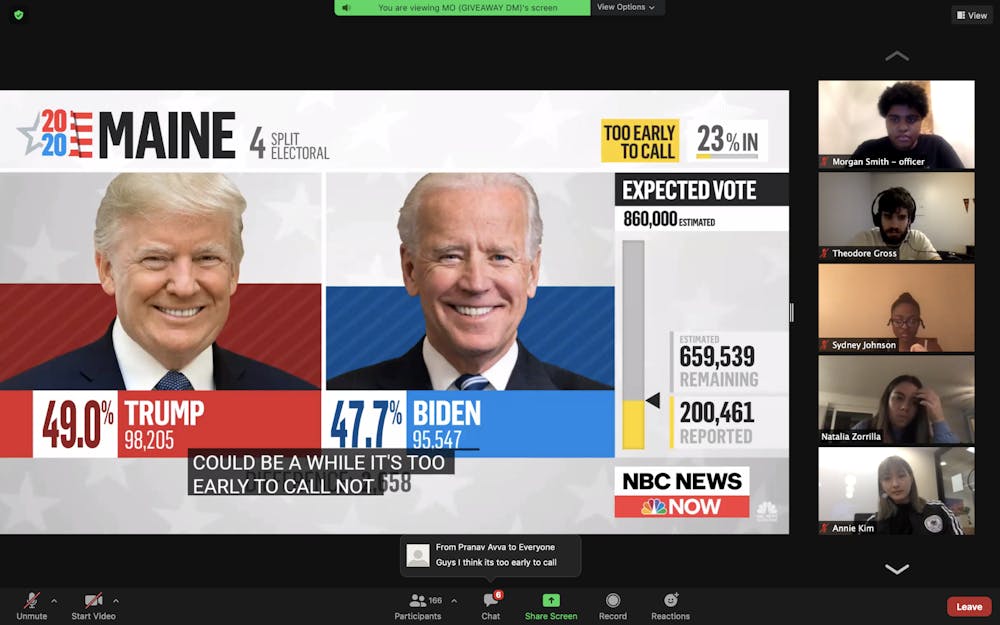On Nov. 3, 230 students joined an Election Night Watch Party hosted by the American Whig-Cliosophic Society (Whig-Clio). As the first results of election night rolled in, students shared their reactions and participated in prize raffles.
The Undergraduate Student Government Senate and Vote100, a campus campaign encouraging voter turnout, co-sponsored the event.
As early predictions from North Carolina, Texas, Pennsylvania, and Florida came in as the event began, Maria Khartchenko ’24, a prospective computer science major from New Jersey, expressed concern.
“I’m honestly very scared because I expected Biden to be way ahead,” she said. “Trump seems to be ahead, which is terrifying to me because I never expected it to be so close.”
Amna Amin ’20, a politics major from Pennsylvania, said she felt “cautious optimism” about Biden’s chances in her home state.
“I still think it’s a toss-up 50–50, but considering [PA] absentee ballots counted later will likely swing blue, I think Biden has a chance,” Armin noted.
Throughout the night, organizers raffled off 42 prizes, with 28 attendees receiving smaller “tier 3” items, eight receiving “tier 2” U-store products and class banners, five receiving “tier 1” AirPods or Nintendo switches, and one receiving a Sen. Ted Cruz ’92 (R-Texas) cutout.
Christina Luo ’23, a prospective economics major, initially forgot to attend the call, showing up 10 minutes prior to the tier one prize raffle she’d eventually win.

“This entire day has been [filled with] mildly chronic stress and anxiety,” she said. “So it’s nice to just have a little random surprise.”
Attendees were also asked to participate in a swing state prediction competition. Once those elections results are reported, the participant with the most accurate predictions will win a yet-to-be announced prize.
Morgan Smith ’21, a School of Public and International Affairs concentrator and president of Whig-Clio, said she hoped that raffling prizes “could provide some sort of tangible experience in the virtual space.” She also said she acknowledged the limitations of an online event.
“I was part of planning the 2018 Whig-Clio Midterms Watch Party, and it was three floors of blowout really,” she said. “That’s one of the things I really mourn now — we were going all night then, just imagine what this year would have looked like.”

Smith said she felt heartened by the turnout and thought the Watch Party brought “that same energy, even though [it was] online.”
“Even though [the election] has been contentious, the goal of our social event [was] to bring everyone together in a shared space,” she added. “Whether you’re in Whig, whether you’re in Clio, or neither, social events are a space to bridge those two spheres.”
Matthew Wilson ’24, a member of Whig-Clio governing council and publicity chair, also spoke to the energy of the night. “I am a freshman, so this is really exciting, a trial by fire almost, being thrown into this big event as an officer and seeing the turnout,” he said.
While event participants repeatedly messaged the Zoom chat to express appreciation for the Whig-Clio officers, reactions to the election results were ambivalent. Attendees frequently typed “too close to call” in the chat.
Wilson shared that view. “There isn’t going to be a wave for either candidate,” he said. “There isn’t going to be a decisive winner.”
He said President Donald Trump had performed strongly among demographics not previously in play for Republicans, most notably Latino voters in Florida and Black men.
"We’re seeing a broader realignment playing out tonight, having more Black and Hispanic voters realizing the Republican Party’s an option for them,” Wilson said. “But at the same time, a lot of white, suburban women [are] turn[ing] away from the Republican Party."
As the Watch Party passed 10:30 p.m. EST, Kesavan Srivilliputhur ’23, a prospective chemistry major from Texas, expressed disappointment that many of his fellow Texans voted for Trump despite the president’s “abysmal pandemic response” and said he was concerned about congressional race results in Georgia.
“What not enough people are talking about is that Georgia elected a QAnon supporting Congresswoman [Marjorie Taylor Greene],” he said. “That is disgusting, disgraceful, and really shakes my faith in our democracy. That scares me.”
Aisha Tahir ’23, an African American studies concentrator from Georgia, said she was focused instead on the possibility of her state turning blue. “I know it isn’t usually a swing state, so that is something that makes me hopeful. But it’s still too early to call,” she said.
In the week leading up to the Watch Party, Whig-Clio members participated in The Civic Party Showdown — a “civic engagement competition” in which members completed activities such as phone banking or voting. Each activity garnered points for the member’s party. The left-leaning Whig party won with 38 points; its right-leaning counterpart, Clio, ended with 16.
At the Watch Party’s conclusion, Drew Hopkins ’24, a prospective history concentrator, said he was “pleasantly surprised.”
“The chat has been lively and the officers have been doing a good job with the raffles, in my opinion,” he noted. “You take the victories that you can get.”








